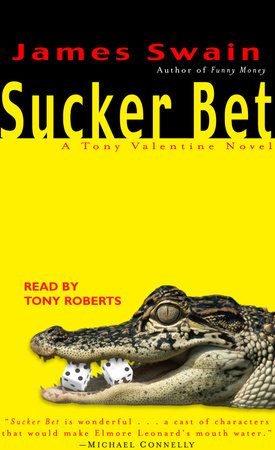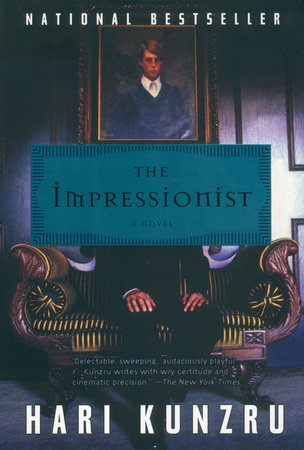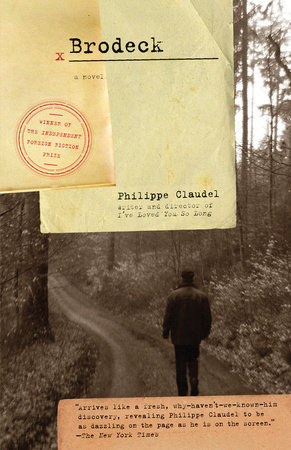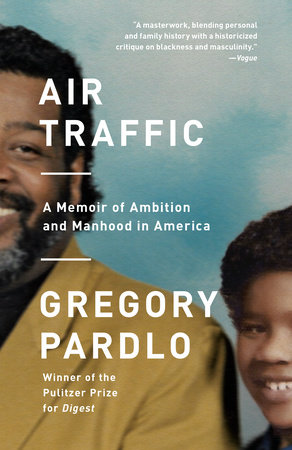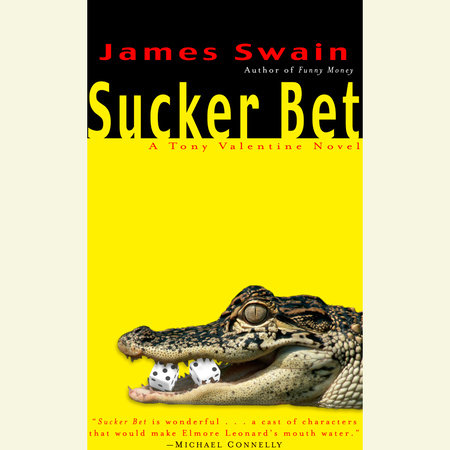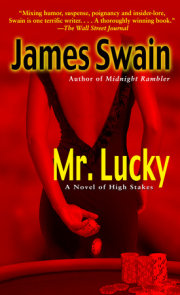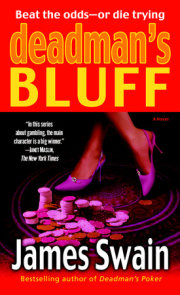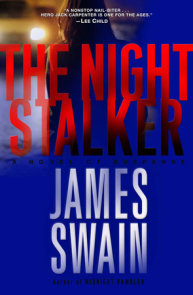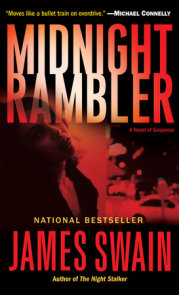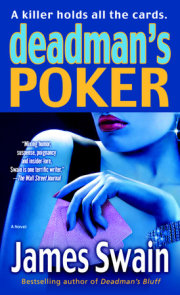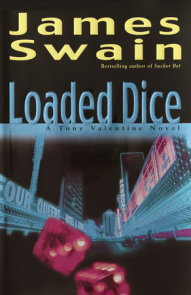Author Q&A
Interview with James Swain, author of Sucker Bet (on-sale: April 15, 2003):
Question:Your hero, Tony Valentine, lives and works in Florida, as you do. He’s an expert in the gambling world, as you are. He’s also an ex-cop, which you’re not. In what other ways is Tony most like and unlike James Swain?
James Swain: I’m often asked if Valentine is my alter ego, which he is not! Valentine doesn’t gamble (I do), doesn’t drink (I enjoy an occasional beer), and thinks hustlers are slime (I have several good friends who are hustlers). The one thing I share with my main character is a passion for understanding how people are cheated, and exposing it.
Q:Where did this passion come from?
JS: I was raised in a household where lying and cheating were not tolerated. Having the amount of knowledge I do about this subject, I realized I’d be doing people a favor by exposing hustlers’ methods.
Q:One thing about Tony that’s a welcome change from a lot of male detective heroes is that he’s believably his age. Not just mentally, but physically. Tony is capable of heroics, but his body pays a price. How were you able to get inside not only the head but the body of an older character so convincingly?
JS:When I first started writing these books, Valentine was a minor character whom I based upon several older gentlemen I knew (including my father). He had his own voice, and I simply wrote down his feelings and thoughts. It was my wife’s idea that he should be my main character.
Q:So she gets 50% of your earnings?
JS:No, she gets 100%!
The real motivation behind Valentine comes from a comment my father made a few years ago. I asked my dad how he liked being retired, and he said, “I don’t count anymore.” In a way, Valentine is always trying to prove that he still does count, even though he often pays a price.
Q:Are the various scams in your books actual scams that people have used? How do you find out about them? And have you ever gotten into trouble for publicly exposing them, either from cops or criminals?
JS:The scams in my books are real, and used by hustlers and cross roaders throughout the world. I became interested in the world of cheaters in 1987, when I saw a man switch a hand at blackjack at the Golden Nugget casino in Las Vegas. After that, I started collecting scams, and through my contacts in the magic world, meeting hustlers in the hopes that they would educate me.
So far, no one has taken exception to my exposing their methods. Magicians like to say that the best way to hide something is to put it into print. I think this also applies to cheating.
Q:What’s a crossroader, and how does a crossroader differ from a hustler?
JS:A crossroader is a person who specializes in ripping off casinos. The expression comes from the Old West practice of cheating at saloons that were located at the crossroads of one-horse towns.
Q:What does it take to be a successful con man, besides good luck? Who is the most successful con man you’ve personally known?
JS:I think I could write a book answering your question. But here’s a short version.
Luck rarely comes into a play with a con. Being a con man requires a thorough understanding of human nature and human greed. W. C. Fields’s expression “You can’t cheat an honest man” is at the core of any good con. And a con man must be willing to spend long hours (sometimes weeks or even months) to execute a successful con. Planning is everything.
The most successful con man I’ve ever met must remain anonymous. He got out of the rackets and now runs a successful business.
Q:Has organized crime been eradicated from the world of casino gambling in the United States, as the casinos like to claim?
JS:Yes. The mob no longer has any ties to casino gambling in this country.
Q:How can someone like me, with no expertise in gambling, much less cons, be sure that I’m not getting ripped off in a casino? Or should I resign myself to losing a set amount and just have a good time?
JS:Never go into a casino expecting to lose! Or accept that you might be cheated. Here’s how to protect yourself on both fronts.
First, gamble in a casino where there is state regulation. Nevada, New Jersey, and other states with legal casinos provide excellent safeguards for players, and make sure the games are legitimate. Try to avoid casinos that are not regulated by states, such as cruises to nowhere, and out-of-the-way Indian casinos.
Second, learn the games before you go. You can win—especially at blackjack and craps—but you need to have a thorough understanding of the rules and percentages before you play.
Q:When you walk into a casino, what games do you play? Do you usually exit a winner? Have you been banned from any casinos?
JS:My favorite game is blackjack (I haven’t had a losing session in many years). I was banned from a casino in Puerto Rico when I asked the dealer to count the cards in a blackjack shoe. The casino was cheating (the shoe was short), and I was shown the door.
Q:Tony has some strong criticisms to make about the Micanopy Indian Reservation Casino in Sucker Bet—and about reservation casinos in general. Do you agree with him? Are reservation casinos generally more susceptible to cheating by outsiders, or to inside scams, than, say, casinos in Las Vegas or Atlantic City?
JS:There are over three hundred Indian reservation casinos in the United States, and their regulation leaves something to be desired. While the big Indian Casinos, such as Foxwoods and Mohegan Sun, do give players a fair shake, many of the smaller ones do not. Most of the cheating at these smaller casinos involves the house ripping off the players. This rarely happens in Las Vegas or Atlantic City.
Q:At one point, Tony mentions a New Jersey Gaming Commission report from some years ago that presented evidence of rigged or crooked high-profile sporting events, including an NFL playoff game and a semifinal match at Wimbledon. Does this report actually exist?
JS:This report does not exist. However, both of those fixes did happen. Sports rigging is as common as poker cheating.
Q:How do you rig something like a playoff game, where millions of people are watching?
JS: There are, unfortunately, a lot of ways to rig a football game. First, you need a player who is susceptible to being bribed. If the player is a kicker, then you pay him to miss a field goal (or two). If the player is a receiver, you pay him to drop a few passes. This is why the NFL prohibits its players from associating with gamblers. It’s a good rule.
Q:It struck me as I was reading Sucker Bet that good writing can be a lot like running a scam. Of course, writers aren’t usually trying to rip off their readers like con artists do, but don’t they use similar techniques to hook their “prey” and reel them in? Did your knowledge of scams, and especially scams involving card handling, teach you any tricks as a writer?
JS:My knowledge of scams has certainly helped me understand human nature and the criminal mind. It has also helped me tremendously when it comes to plotting my books. Good scams are entertaining to the people that are being ripped off. The same is true of a good book.
Q:I believe you originally became interested in card handling as a boy fascinated with magic tricks. How did a boyhood interest in magic lead you into the world of gambling and con artists?
JS:The world of card magic and gambling are parallel; many of the top hustlers are also terrific card magicians. Over the years, I brushed elbows with many hustlers and incorporated their techniques into my own performances.
Q:Recently in the news was a story about a computer programmer who used his cyber skills to score a $3 million payoff in the Breeders’ Cup. How has the advent of online gambling impacted the world of scammers . . . and casual gamblers?
JS:In my opinion, online gambling is the worst idea in recent memory. Online Web sites routinely scam their customers by not paying off winnings. And hackers routinely scam legitimate sites. But the biggest problem is the number of kids who are becoming addicted to gambling through these sites. This is one area of gambling that I am adamantly opposed to.
Q:The epigraph of the novel, “It’s morally wrong to allow suckers to keep their money,” brings to mind W. C. Fields’s famous admonition to “never give a sucker an even break.” On the surface these statements make us smile, but don’t they reflect a serious moral philosophy . . . albeit one most “straight” citizens probably wouldn’t agree with? I mean, it seems as though a lot of con artists really do believe they are ethically entitled to whatever they can get away with.
JS:You are one hundred percent correct. Con artists and hustlers do believe they are entitled to whatever they can steal. They also believe that everyone cheats in one way or another. And, if you’re one of those rare individuals who doesn’t cheat, then you’re a sucker, and deserve whatever happens to you.
Q:One of my favorite characters in Sucker Bet isn’t even human—at least, I don’t think he’s human. I certainly hope he’s not! I’m talking about the amazing Mr. Beauregard, the circus sideshow chimpanzee. Please don’t tell me that you based this evolutionary marvel on an actual chimp . . . or I’ll know you’re trying to con me!
JS:Many years ago, when I was doing magic professionally, I shared a stage with Mr. Jiggs, the world’s smartest chimpanzee. Mr. Jiggs was astonishing; he wore a tuxedo (and roller skates), played several musical instruments, and did sign language with his owner. When I started writing Sucker Bet, I knew he would be a character.
Q:Everywhere you look in Sucker Bet, there are scams and lies unfolding, whether in the casinos or in the lives and relationships of the characters. No one is exactly what they pretend to be, whether they are aware of it or not. Tony is more aware than most when it comes to both self-deceptions and the deceptions of others. This gives him an advantage when it comes to catching bad guys, but it seems to cost him something as well, especially in his personal life.
JS:If I were asked to explain the “theme” of my books, I would probably use this question! Perhaps it has to do with my background as a magician, but I see most people and situations as illusions, with nothing being as it appears to be. It is Valentine’s great gift that he can see through these illusions. But this gift also enacts a terrible price, and puts him out of sync with the rest of the world.
Q:Any movie possibilities for Tony? I know he’s not Italian, but for some reason Brian Dennehy springs to mind in the role . . .
JS:Grift Sense was optioned by Hyperion Studios last May, and it appears that Tony Valentine will become the basis for a TV series. A number of terrific actors have been mentioned to play the lead, including Mr. Dennehy.
Q:What’s next for Tony Valentine . . . and James Swain?
JS:I am currently working on the fourth Tony Valentine book, Candy Store. The story takes place between 1978-1982, when legalized gambling first came to Atlantic City. The story revolves around a serial killer who preys on prostitutes in the casinos, as well as a major scam. It will be published in 2004.
Q:Fascinating—isn’t that the same time frame as Louis Malle’s great movie, Atlantic City? And I assume this means we’ll be seeing a younger Tony, who is still a police officer . . . .
JS:Yes to both questions. Candy Store is filled with scams (all of them true), yet is very much a crime book. Writing about Tony Valentine as a cop is proving to be an extremely enjoyable experience.
